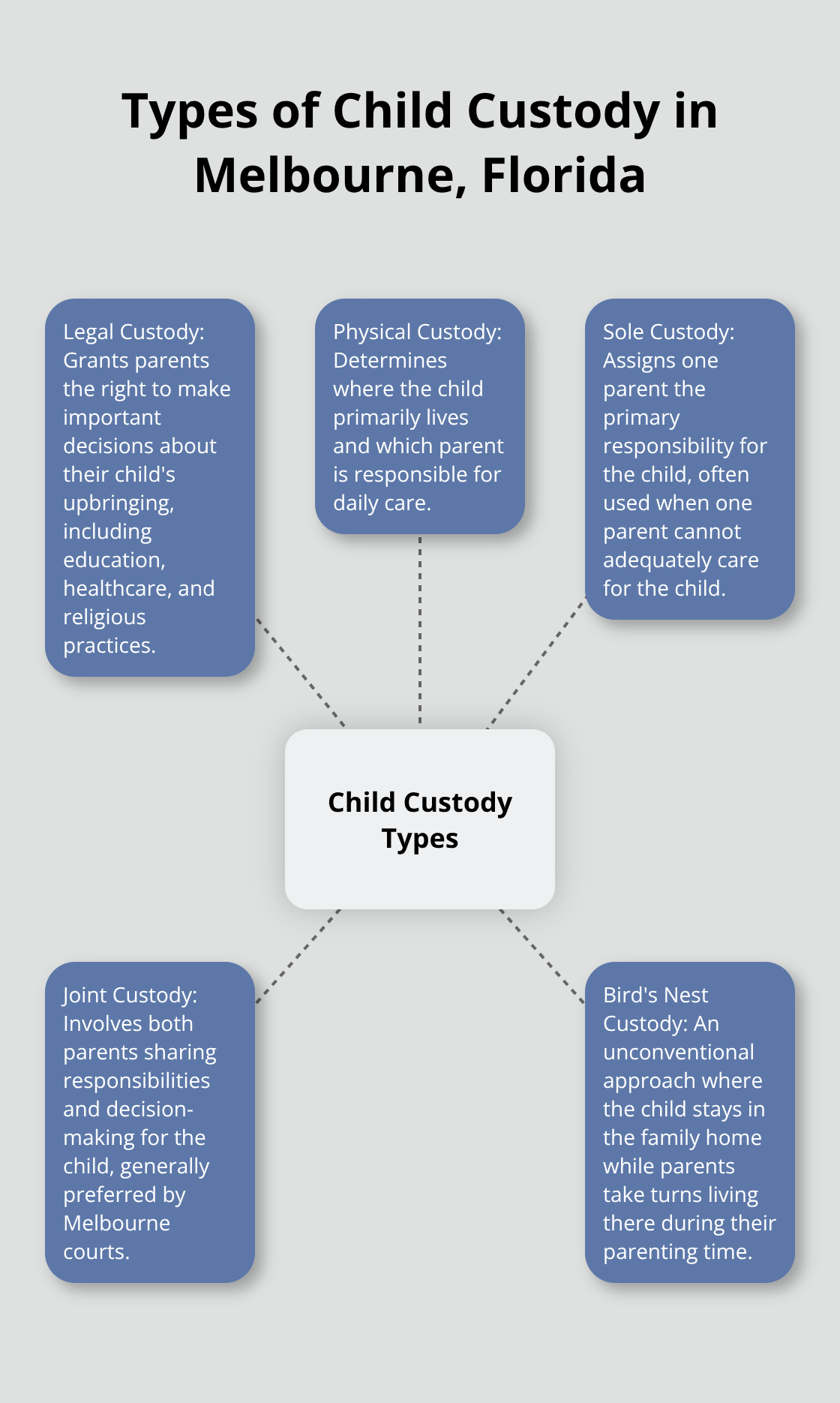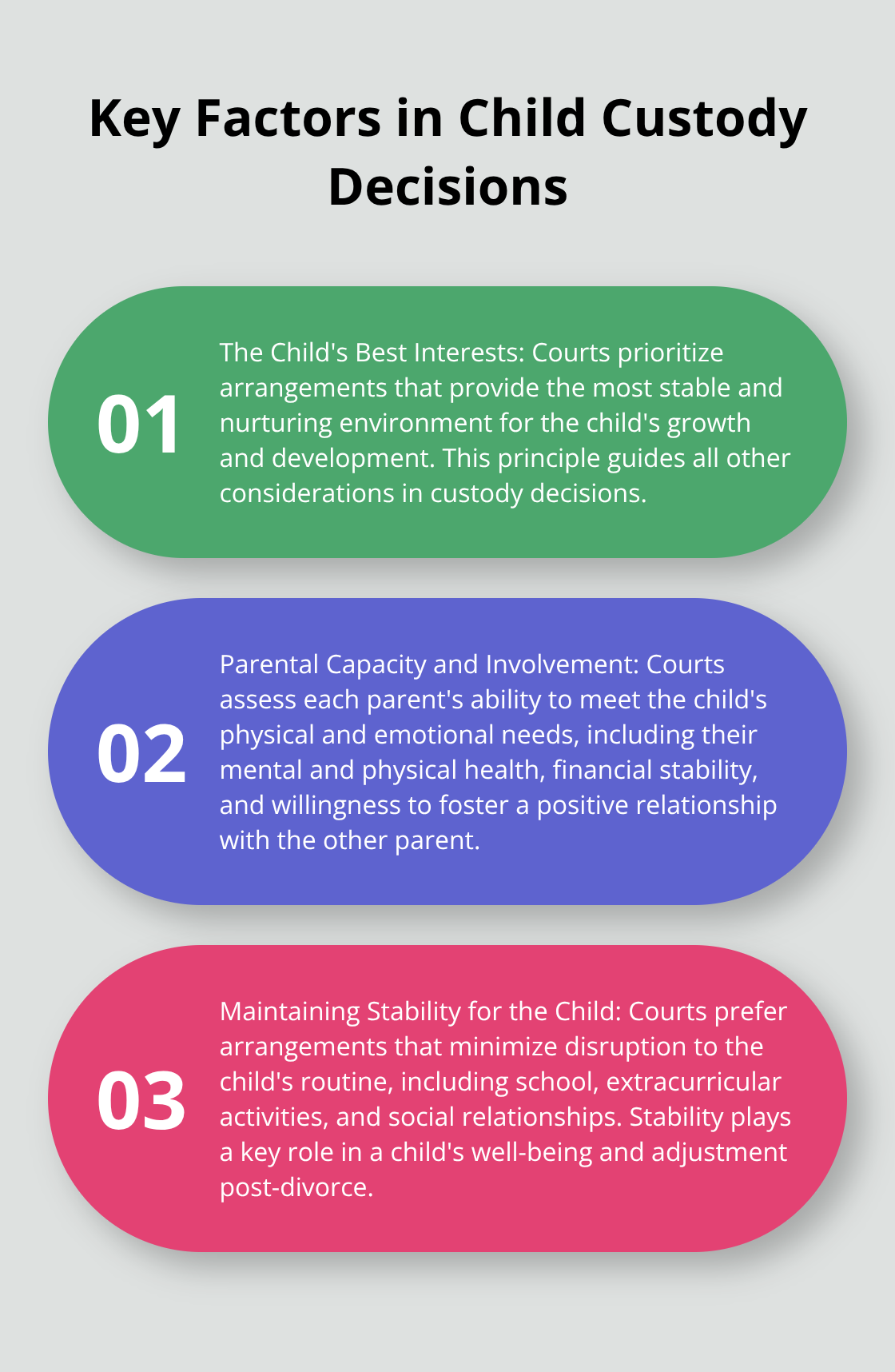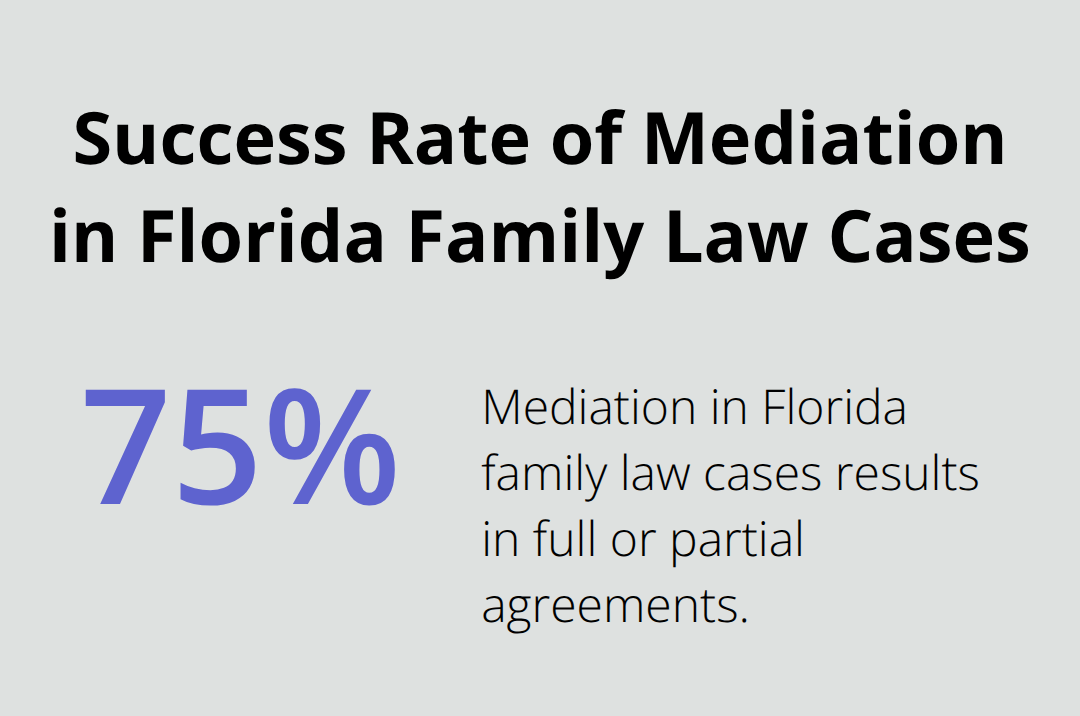Understanding Child Custody Laws in Melbourne Florida
Our Blog
Understanding Child Custody Laws in Melbourne Florida

Child custody laws in Melbourne, Florida, can be complex and emotionally challenging for parents. At Harnage Law PLLC, we understand the importance of navigating these laws to protect your children’s well-being.
This guide will help you understand the different types of custody, factors considered in custody decisions, and the legal process in Melbourne. By familiarizing yourself with these aspects, you’ll be better prepared to make informed decisions about your child’s future.
Types of Child Custody in Melbourne Florida
Legal and Physical Custody
In Melbourne, Florida, child custody arrangements take two primary forms: legal custody and physical custody. Legal custody grants a parent the right to make important decisions about their child’s upbringing (education, healthcare, and religious practices). Physical custody determines where the child primarily lives.
Florida courts often award shared legal custody, which allows both parents to participate in major decisions. Physical custody arrangements, however, can vary widely based on each family’s unique circumstances.
Sole and Joint Custody
Sole custody and joint custody represent two distinct approaches to parental responsibilities. Sole custody assigns one parent the primary responsibility for the child. Joint custody involves both parents sharing these responsibilities.
Melbourne courts generally prefer joint custody arrangements when possible. They believe it serves the child’s best interest to maintain strong relationships with both parents. However, courts may award sole custody in cases where one parent cannot adequately care for the child. This decision always prioritizes the child’s best interests and safety.
Bird’s Nest Custody: An Unconventional Approach
Bird’s nest custody offers a less common but increasingly popular arrangement in Melbourne. This setup keeps the child in the family home while parents take turns living there during their designated parenting time. This approach minimizes disruption to the child’s routine but requires significant cooperation between parents.
This arrangement works well for some families, particularly in the short term. However, it’s not suitable for everyone due to financial and practical considerations (such as maintaining multiple residences).
Each family’s situation requires a unique approach to custody. The best arrangement for your child will depend on various factors specific to your family dynamics.

A thorough understanding of these custody types can help you navigate the legal process more effectively and advocate for an arrangement that truly serves your child’s best interests.
As we move forward, let’s examine the factors that courts consider when making child custody decisions in Melbourne, Florida.
Factors Influencing Child Custody Decisions in Melbourne, Florida
The Child’s Best Interests: A Primary Consideration
Florida law mandates that courts prioritize the child’s best interests when making custody decisions. This principle guides all other considerations. Courts evaluate which arrangement will provide the most stable, nurturing environment for the child’s growth and development.
Parental Capacity and Involvement
Courts assess each parent’s ability to meet the child’s needs (both physically and emotionally). This includes an evaluation of the parent’s mental and physical health, financial stability, and willingness to foster a positive relationship between the child and the other parent. A parent who demonstrates active involvement in their child’s life, such as attending school events or medical appointments, may receive a favorable view from the court.

Maintaining Stability for the Child
Stability plays a key role in a child’s well-being. Courts often prefer arrangements that minimize disruption to the child’s routine, including school, extracurricular activities, and social relationships. If one parent has been the primary caregiver, this factor may influence the court’s decision to maintain continuity in the child’s life.
In cases where significant changes must occur, courts may implement a gradual transition plan to help the child adjust. This approach highlights the importance of providing a stable environment during and after custody proceedings.
Co-Parenting and Communication
Courts in Melbourne often favor arrangements that allow children to maintain strong connections with both parents, unless circumstances dictate otherwise. This approach aligns with research showing that children generally benefit from having meaningful relationships with both parents post-divorce.
Parents should prepare to demonstrate how their proposed custody arrangement will provide stability and continuity for their child. This might include presenting a detailed parenting plan that outlines how the child’s daily routines, education, and social activities will continue.
Unique Circumstances of Each Case
While these factors guide the court’s decision, each case presents unique challenges. The weight given to each factor can vary depending on the specific circumstances of the family. Working with an experienced family law attorney can help parents navigate this complex process and advocate effectively for an arrangement that truly serves their child’s best interests.
As we move forward, we will explore the child custody process in Melbourne, Florida, including filing procedures, mediation, and court hearings.
Navigating the Child Custody Process in Melbourne
Filing for Custody
The child custody process in Melbourne, Florida starts when a parent files a petition for custody with the Brevard County Circuit Court. This document outlines the proposed custody arrangement and reasons for seeking it. Florida courts use the term “time-sharing” instead of custody. The filing fee for a custody petition in Brevard County is $409 (as of 2023), with fee waivers available for those who qualify.
Mediation: A Key Step
Most cases in Melbourne require mediation before proceeding to court. A neutral third party helps parents reach an agreement on custody and visitation schedules. Mediation in Florida family law cases has a success rate of about 75% for full or partial agreements.
Mediation offers several advantages:
- It’s typically faster and less expensive than a trial.
- Parents have more control over the outcome.
- It can improve communication between parents (beneficial for co-parenting).

Court Hearings and Evaluations
If mediation fails to produce an agreement, the case moves to court. The judge may order a custody evaluation, where a mental health professional assesses family dynamics and makes recommendations. These evaluations can take several weeks and cost between $1,500 to $6,000 (or more), depending on case complexity.
During court hearings, parents present evidence supporting their proposed custody arrangements. This might include testimony from character witnesses, school records, or evidence of each parent’s involvement in the child’s life. Thorough preparation for these hearings is essential, as they significantly impact the final custody decision.
Temporary and Final Orders
Courts may issue temporary custody orders while the case is ongoing. These orders provide structure until a final decision is made. Final custody orders are typically issued after all evidence has been presented and considered. These orders detail the custody arrangement, including time-sharing schedules and decision-making responsibilities.
Modifying Existing Arrangements
Life changes can necessitate modifications to existing custody arrangements. To modify a custody order in Melbourne, a parent must show a substantial, material, and unanticipated change in circumstances. This could include a parent’s relocation, changes in work schedules, or concerns about a child’s safety or well-being.
The modification process involves filing a petition with the court, potentially going through mediation again, and possibly attending court hearings. Courts generally favor stability for children, so the burden of proof for modifications is high.
Final Thoughts
Child custody laws in Melbourne, Florida protect children’s interests while respecting parental rights. The custody process involves complex decisions that shape families’ futures. Parents must prioritize their children’s well-being throughout this challenging journey.
Mediation provides an opportunity for parents to find mutually agreeable solutions. Courts strive to create arrangements that offer stability and meaningful relationships with both parents. Professional legal guidance can help navigate the intricacies of custody laws and advocate for your rights.
Experienced family law attorneys offer invaluable assistance in custody cases. They prepare necessary documentation and represent your interests effectively. As you proceed with your case, focus on supporting your children’s growth and happiness in the years ahead.
